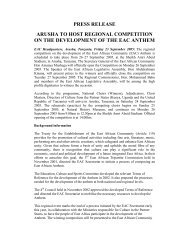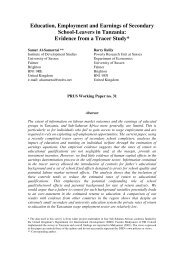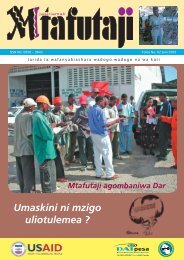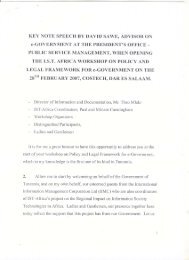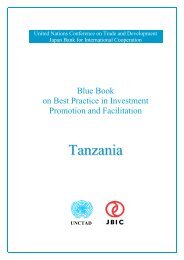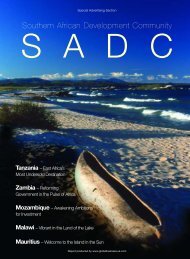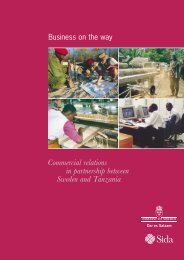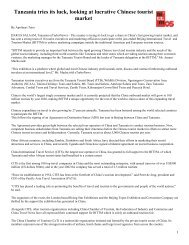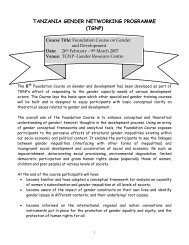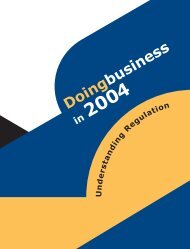Designing e-Government for the Poor - Tanzania Development ...
Designing e-Government for the Poor - Tanzania Development ...
Designing e-Government for the Poor - Tanzania Development ...
You also want an ePaper? Increase the reach of your titles
YUMPU automatically turns print PDFs into web optimized ePapers that Google loves.
178<br />
Uzbekistan<br />
Title: E-government<br />
Proposer: Mr. Shukhrat Atamukhamedov, Assistant to Deputy Prime<br />
Minister<br />
Country: Uzbekistan<br />
Date: March 2005<br />
I. INTRODUCTION<br />
In June 2002, <strong>the</strong> <strong>Government</strong> of Uzbekistan approved a National<br />
ICT development programme. It established <strong>the</strong> Coordination Council <strong>for</strong><br />
development of Computerization and In<strong>for</strong>mation-Communication Technology.<br />
The <strong>Government</strong> has adopted laws regulating in<strong>for</strong>matization, digital<br />
signature, electronic document flow, and e-commerce. The <strong>Government</strong> is<br />
advocating <strong>the</strong> use and development of ICT. In August 2002, <strong>the</strong> <strong>Government</strong><br />
of Uzbekistan initiated an experimental implementation of a Unified<br />
electronic in<strong>for</strong>mation system of <strong>for</strong>eign trade operations. The implementation<br />
of <strong>the</strong> present system that has involved <strong>the</strong> State Customs Committee,<br />
Central Bank and authorized banks of Republic of Uzbekistan, State Tax<br />
Committee, as well as <strong>the</strong> Agency of Foreign Economic Activities has<br />
considerably simplified procedures regarding transit of goods and contract<br />
fulfillments by entrepreneurs. The majority of central administration bodies<br />
and regional administrations have <strong>the</strong>ir own web sites and local computer<br />
network systems. Within <strong>the</strong> government administration office, <strong>the</strong>re is one<br />
computer per three government officials. However, only 10 per cent of<br />
government officials have access to <strong>the</strong> Internet on <strong>the</strong>ir computer. A<br />
significant number of central governmental administration offices as well as<br />
local departments have implemented in<strong>for</strong>matization programmes. Each<br />
department develops and supports its own in<strong>for</strong>mation system, and does not<br />
interact with systems of o<strong>the</strong>r departments. Overall, <strong>the</strong> current status of<br />
e-government in Uzbekistan is still in its initial stage and relatively<br />
underdeveloped.<br />
II. ISSUES<br />
In order to introduce, implement, and sustain e-government<br />
programmes, government must be reengineered and reorganized. This<br />
requires a trans<strong>for</strong>mation of <strong>the</strong> relationship between government administration<br />
and society. It is a complicated process requiring significant financial<br />
expenses and presents numerous legal, administrative, and technological<br />
issues. The leading obstacle to <strong>the</strong> expansion and distribution of ICT is<br />
poverty. The majority of <strong>the</strong> population cannot af<strong>for</strong>d access to electronic<br />
technology. There<strong>for</strong>e, electronic services should be provided to <strong>the</strong> population<br />
at a very low rate. Ano<strong>the</strong>r issue is <strong>the</strong> lack of awareness on <strong>the</strong><br />
benefits of ICT, and potential benefits of e-government programmes.



